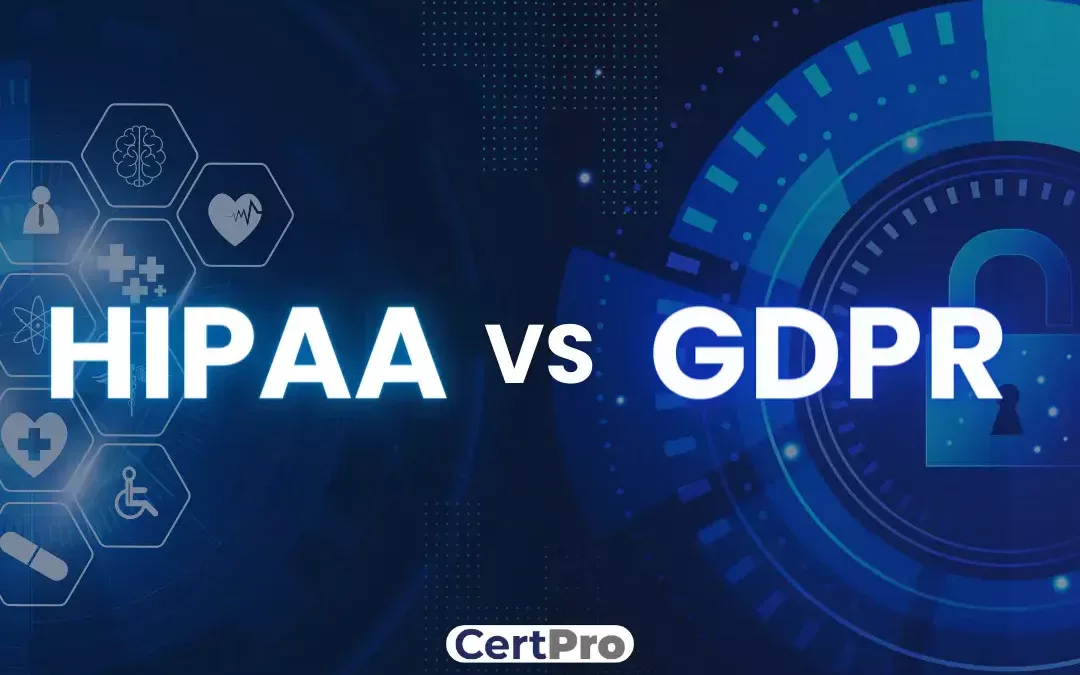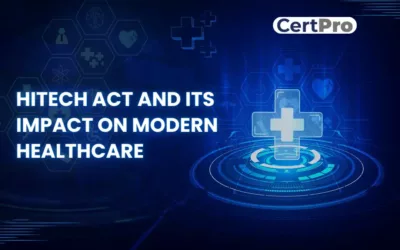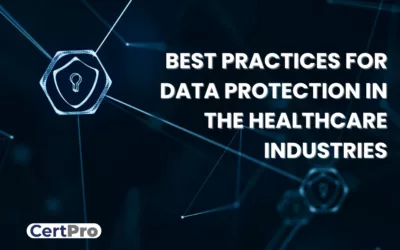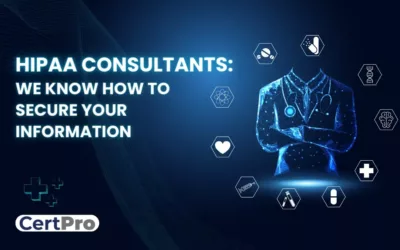In today’s interconnected world, data protection and privacy regulations play a crucial role in safeguarding sensitive information. Two prominent frameworks that govern data privacy and security are the Health Insurance Portability and Accountability Act (HIPAA) in the United States and the General Data Protection Regulation (GDPR) in the European Union. These regulations aim to ensure the confidentiality, integrity, and availability of personal information while also empowering individuals with rights and control over their data.
Both the General Data Protection Regulation and the Health Insurance Portability and Accountability Act are significant legal frameworks for safeguarding the privacy and security of personal information about individuals, but they apply to different situations and have some key distinctions.
This article provides a comparative analysis of HIPAA and GDPR compliance, exploring their key provisions, scope, similarities, and differences. Understanding these regulations is essential for organizations operating in the healthcare and data-driven sectors to ensure compliance and maintain the privacy and security of personal data.
WHAT IS HIPAA COMPLIANCE?
The Health Insurance Portability and Accountability Act (HIPAA) was enacted in 1996 in the United States. It was designed to address the privacy, security, and confidentiality of individually identifiable health information. The main goal is to ensure that patients’ sensitive health information is properly safeguarded while also allowing for the secure exchange of medical data. It applies to covered entities, which include healthcare providers as well as their business associates who handle ePHI (electronic protected health information).
Penalties for HIPAA breaches include both civil and criminal consequences. Enforcement of HIPAA compliance is the responsibility of the HHS Office for Civil Rights (OCR). Depending on the seriousness of the infringement, penalties for non-compliance might range from $100 to $50,000 in fines. Penalties for deliberate negligence can be as high as $1.5 million per offense.
BENEFITS OF HIPAA
1. Patient’s Privacy Protection: It provides individuals with increased control over their personal health information (PHI). It establishes standards for the use and disclosure of PHI, requiring covered entities to obtain patient consent for certain uses and to inform individuals about their privacy rights.
2. Patient Rights and Control: The HIPAA regulations provide people with some control over their health information. Patients have the right to see and get a copy of their medical records, ask for incorrect information to be corrected, and get a list of disclosures that have been made. Additionally, they have the right to choose how their information is used and disseminated and can provide or withdraw consent for certain uses.
3. Breach notification: In the event of a breach of unsecured PHI, covered entities are required by the HIPAA Breach Notification Rule to inform affected persons, the Secretary of the Department of Health and Human Services (HHS), and, in certain cases, the media.
4. Improved Data Accuracy and Quality: With HIPAA’s Privacy Rule, individuals have the right to access and request amendments to their health records. This encourages healthcare providers to maintain accurate and up-to-date patient information.
5. Accountability and Compliance: HIPAA establishes requirements for covered entities and their business associates, ensuring accountability for the handling of PHI.
6. Legal Compliance and fines Avoidance: Adherence to HIPAA rules helps healthcare companies and their business partners stay out of trouble with the law and avoid fines.
REQUIREMENTS OF HIPAA COMPLIANCE
1. Administrative Safeguards: These safeguards involve the development and implementation of policies, procedures, and practices to manage the security of electronic protected health information (ePHI).
2. Physical Safeguards: These requirements pertain to the physical protection of electronic systems, equipment, and data against unauthorized access, damage, or theft.
3. Technical Safeguards: These requirements involve the use of technology to protect and control access to ePHI.
4. Organizational Requirements: This category focuses on policies and procedures that must be implemented to prevent a violation of the Security Rule.
5. Policies and Procedures: Covered entities are required to develop and implement policies and procedures to comply with the Security Rule. These policies should address topics such as workforce training, data backup, disaster recovery, and incident response.
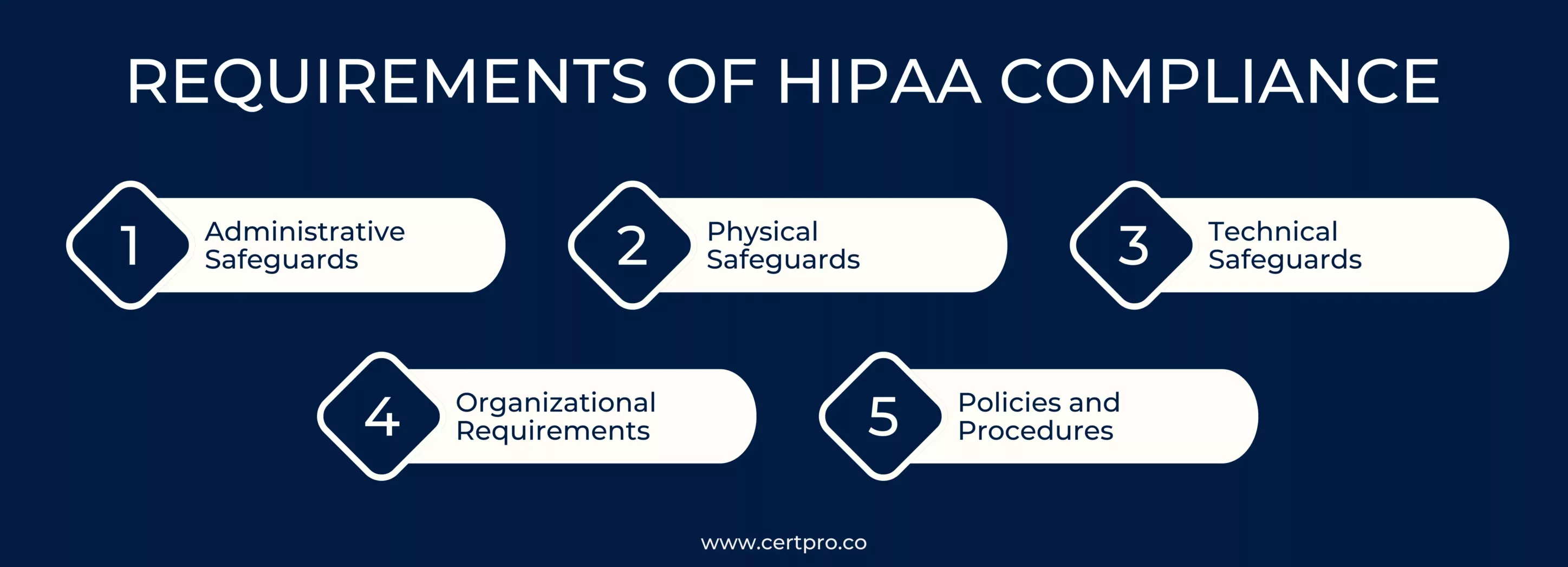
WHAT IS GDPR COMPLIANCE?
The General Data Protection Regulation (GDPR), which came into effect in 2018, governs the protection of personal data across the European Union. Its primary objective is to empower individuals with greater control over their personal information and harmonize data protection laws across EU member states. It applies to organizations that process the personal data of EU residents, regardless of their geographical location.
It introduces various rights for individuals, such as the right to access, rectify, and erase their data, as well as the right to data portability. The regulation also imposes obligations on organizations, including the implementation of privacy by design and conducting data protection impact assessments.
BENEFITS OF GDPR
1. Enhanced Data Protection: The protection principles prioritize the protection of personal data and ensure that organizations implement appropriate security measures to safeguard it.
2. Individual Empowerment and Control: It gives individuals greater control over their personal data. The protection principles empower individuals with rights such as the right to access, rectify, and erase their data, the right to object to processing, and the right to data portability.
3. Transparency and Trust: GDPR compliance fosters transparency and builds trust between individuals and organizations. By adhering to the principles, organizations are required to provide clear and easily understandable information to individuals about the processing of their personal data.
4. Improved Data Accuracy and Quality: It promotes data accuracy and quality. Organizations are encouraged to maintain accurate and up-to-date personal data.
5. Ethical Data Handling: It promotes ethical data handling practices. Organizations are required to process personal data lawfully, fairly, and transparently.
Compliance with the GDPR protection principles leads to improved data protection, individual empowerment, transparency, trust, and ethical data handling. It ensures that personal data is handled responsibly while also providing organizations with a competitive advantage and the ability to build strong relationships with individuals based on trust and respect for privacy.
REQUIREMENTS OF GDPR COMPLIANCE
The General Data Protection Regulation (GDPR) outlines several key requirements that organizations must comply with when handling personal data.
The following are the requirements of the GDPR:
1. Legal basis for data processing: Organizations are required to demonstrate a legal justification for handling personal data. This could include obtaining consent from the data subject, fulfilling a contract, complying with legal obligations, protecting vital interests, performing a task carried out in the public interest, or pursuing legitimate interests.
2. Consent: When relying on consent as the lawful basis for processing personal data, organizations must ensure that consent is freely given, specific, informed, and unambiguous.
3. Data Breach Notification: Organizations must have processes in place to detect, investigate, and report data breaches to the relevant supervisory authority within 72 hours of becoming aware of the breach, unless it is unlikely to result in a risk to individuals’ rights and freedoms.
4. Data Subject Rights: It grants individuals certain rights regarding their personal data. These rights include the right to access their data, rectify inaccuracies, erase data, restrict processing, object to processing, have data portability, and not be subject to automated decision-making.
5. Accountability and Compliance: Organizations must be able to demonstrate compliance with GDPR requirements by implementing appropriate policies, procedures, and documentation.
COMPARISON BETWEEN GDPR AND HIPAA COMPLIANCE
The key differences are:
- Scope and Geographic Applicability:
HIPAA: It is specific to the United States and primarily focuses on protected health information (PHI) within the healthcare industry.
GDPR: It is a comprehensive regulation that applies to the European Union (EU) and covers the processing of personal data in all sectors.
- Focus on Personal Data:
HIPAA: It primarily focuses on protected health information (PHI) within the healthcare sector.
GDPR: It focuses on the protection of personal data, which is defined broadly as any information that can directly or indirectly identify an individual.
- Consent Requirements:
HIPAA: It does not generally require explicit consent for the use or disclosure of PHI for treatment, payment, or healthcare operations.
GDPR: It strongly emphasizes obtaining individuals’ explicit and informed consent before processing their personal data.
- Penalties:
HIPAA: The violations can result in civil monetary penalties imposed by the Department of Health and Human Services (HHS). The penalties vary in severity depending on the violation’s nature and level of negligence.
GDPR: It introduces significantly higher penalties for non-compliance. Violations can result in fines of up to €20 million or 4% of the organization’s global annual turnover, whichever is higher, for the most serious infringements.
In summary, while both HIPAA and GDPR aim to protect personal data and privacy, they have distinct differences in scope, applicability, consent requirements, individual rights, and enforcement mechanisms. By understanding these differences and implementing appropriate measures, organizations can navigate the complex landscape of data protection regulations and safeguard individuals’ personal information effectively.
FAQ
CAN AN ORGANISATION BE SUBJECT TO BOTH REGULATIONS ?
WHAT DO HIPAA AND GDPR REGULATE?
WHO ENFORCES COMPLIANCE?
WHAT ARE THE PENALTIES FOR NON-COMPLIANCE?
HOW CAN AN ORGANISATION ENSURE COMPLIANCE ?

About the Author
SHREYAS SHASTHA DRUPADHA
Shreyas Shastha Drupadha, a Senior Business Consultant. Serving as an ISO 27001 Lead Auditor, Shreyas ensures the establishment of robust information security management systems. His expertise also encompasses GDPR, HIPAA, CCPA, and PIPEDA implementation.
HITECH ACT AND ITS IMPACT ON MODERN HEALTHCARE
In 2009, the Health Information Technology for Economic and Clinical Health or HITECH Act was signed to transform the American healthcare industry. The laws worked as a forward-thinking process of changing patient services. In this regard, the Patient Protection and...
BEST PRACTICES FOR DATA PROTECTION IN THE HEALTHCARE INDUSTRIES
In the healthcare sector, safeguarding sensitive information about patients is extremely important. Patient data includes personal details, medical histories, and treatment plans. Therefore, it must be protected and should be confidential. Thus, breaches not only...
HIPAA CONSULTANTS: WE KNOW HOW TO SECURE YOUR INFORMATION
Navigating HIPAA compliance can be complex; therefore, organizations seek advice from HIPAA consultants. These HIPAA experts have specific knowledge. They can help firms to understand the problematic standards of the Healthcare Privacy Act. In 1996, HIPAA was created....

